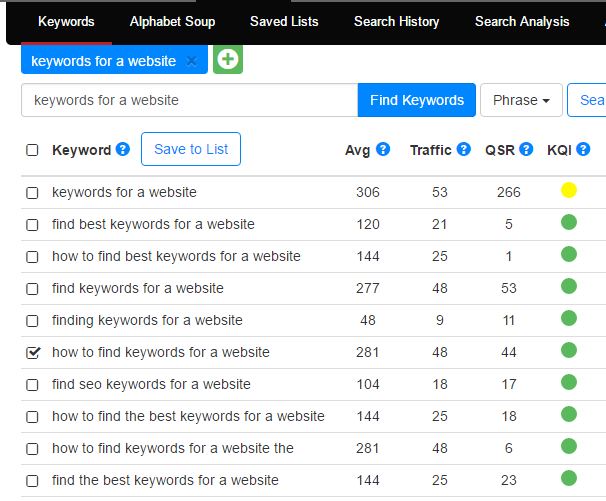How to Find Keywords for a Website
We’ll start with a clear and simple definition of keywords, including some examples, and discuss why they are so important. We’ll then identify the 4 key characteristics of an effective keyword. Finally, we’ll conclude with tools and techniques for finding effective keywords for your website. Let’s get started, shall we?
What are Keywords for a Website?
Very simply, keywords are the words and phrases that Internet users type into search engines when they want to find information. It all starts with that little search box! Search queries can range from single words to more complex sentences. If we look at possible searches around the topic of this post, we might see examples like the following:
- keywords
- keyword research
- What are keywords?
- What is a keyword?
- How to do keyword research
- How to find keywords
- How to find keywords for a website
Vast numbers of Internet users find the idea of making money online with a website to be fascinating. Consequently, keywords are an extremely popular topic. This popularity means multiple users conduct all of these searches on a routine basis. How can I state that with certainty? Because the major search engines including Google, Yahoo, and Bing keep track of all queries and store the queries in searchable databases.
Why Are Keywords Important?
I can’t resist answering that question by posing another question. If you write an article and publish it on your website,
I suspect we can all safely agree; that’s not the result we’re striving to achieve. When Internet users type their queries into a Google search box, we all want our article to stand out prominently in the SERPs (search engine results pages). The ultimate goal is page 1 and position 1 because the lion’s share of traffic will click on the top ranking SERP results.
Page 1 ranking can only occur if we craft our posts around effective keywords. Naturally, there are additional Search Engine Optimization (SEO) techniques we must apply, but effective keywords are an essential element of success.
4 Key Characteristics of an Effective Keyword
Every page and post on a website will incorporate one main keyword. Your focal keyword should appear in the title of your blog, somewhere within the first 140 characters you write, and perhaps once more at the very end of your post. That’s sufficient and including this targeted phrase any more than that is not desirable. An effective keyword choice will always have all four of the following attributes.
1 – Relevance
The targeted keyword must be highly relevant to both the specific post you are currently writing and your niche, in general. Remember, readers are searching for answers to their questions. If your article promises answers but then doesn’t really deliver, visitors will leave your website immediately. It’s possible to tease readers with a keyword, and your traffic may increase dramatically. But if they don’t stay to read the article, browse your site and consider the products you’re promoting, what’s the point?
You will tailor your site, as a whole, to the needs of a targeted group of people. All keywords used should be consistent with the interests of this market. The idea is to draw people in by meeting their needs for information. If visitors to your site find the answers they are seeking, they will return. It’s really just as simple as that!
2 – Low Competition
Small niche website owners, like myself, search for keywords that have a very low competition rate. I prefer a keyword where there are less than 100 direct competitors already targeting that keyword. Low competition makes it much easier to rank for that keyword. Invariably, I will select a long tail keyword as the focus of my blog post. A long tail keyword is a phrase that contains 4 or more words. In general, long tail keywords are more specific in nature and will typically have far less competition.
What else should you consider?
Even if the volume of competition is low, you will probably want to check out who the competition is for the phrase you have chosen. Before I make my final selection and write a blog post, I always perform a Google search. If Page 1 of the SERPs is populated by large authority sites like Forbes, I will probably go back to the drawing board. It’s highly unlikely that a niche site will ever outrank an authority site. But if the first few results for the keyword are blogs like my own, I’m happy.
3 – Monthly Traffic (Searches)
This one is fairly obvious, but we’ll cover all the bases. We want a keyword that attracts some traffic every month. I look for at least 50 searches per month. Additionally, I want to see monthly traffic that is more than the number of competing sites. This type of search term is often referred to as low-hanging fruit because it is easier to get your page ranked in the search engines. You will not see a lot of traffic for each post, but if you publish frequently, the cumulative traffic will add up nicely.
4 – A Grammatically Correct Phrase
We’ll look at the results of a keyword search in a moment. You will then understand why I include this trait. Searchers often take shortcuts when typing queries into search engines. As a result, many queries in the database will not make grammatical sense. When composing your blog article, you will be including your exact keyword in your text. Obviously, a phrase with poor grammar is not going to impress either your readers or Google with the quality of your article.
So, How Do We Find These Keyword Gems?
Let’s start with the first attribute on our list, relevance. I think of this as the cornerstone or pillar attribute from which everything else will flow. Our search will begin broadly with a general topic that is intrinsic to our chosen niche. As an example, my niche is comprised of individuals who are interested in making money online.
They are at or near retirement age and are exploring options for supplementing retirement income. Secondarily, they may be seeking something of substance to occupy a portion of their time and ensure they remain mentally active. What better path than the Internet? This goal of earning money online is definitely achievable. Realistically, it can’t be achieved without a website. Hence, my site is devoted to topics such as making money with affiliate marketing, building a website, and developing that new website.
How I Find Relevant Niche Topics
These steps will work for any chosen niche. First, check out your competition. Isn’t that what any new business owner does? You wouldn’t open a brick and mortar store without visiting similar stores in the same locale. Similarly, if you want to develop a website in a chosen field, you need to browse competing websites to get a sense of their content.
Topical Resources
There are also forums on the Internet devoted to the topic of your choice. I find Quora to be an invaluable question and answer site that is essentially a global forum. Sites like e-how can be very enlightening. Additionally, I use Google Trends and subscribe to Google Alerts to get a sense of new products and issues on the horizon. I follow established, award-winning blogs like ProBlogger and SmartBlogger and happily take advantage of all of the free tips and resources they share. In short, there is no shortage of inspiration.
I also derive a wealth of information from the online community called Wealthy Affiliate (pun intended
So, based on my knowledge of my niche, I’m comfortable that keywords and keyword research are relevant topics. But they’re also very comprehensive, and I know that with the enormous number of websites in the make money online arena that the competition for these terms will be intense. I have to narrow my focus, and that’s when I use a keyword search tool to accomplish some brainstorming.
Keyword Search Tools
Jaaxy is my tool of choice. Jaaxy is an incredibly powerful tool and represents one of the best niche keyword tools on the market. This research tool collects data from the three major engines (Google, Bing, and Yahoo) and displays the results in a simplified manner. So that’s what I’m going to use to show you some search results and discuss the relative merits of keywords we will uncover through this process. Maybe you can use this tool to convert some gold nuggets into a profit-making blog.
My starting Point
I’m going to begin with my broad subject of interest – keywords for a website. I’ve entered this into Jaaxy’s search box as a seed term knowing that I will see multiple variations and similar terms. This represents a long tail search term. Here is a screenshot of my results (with the most relevant data). The full list was far more extensive, but this is sufficient for our discussion.
The column labeled keyword represents actual search terms that Internet users type into search engine text boxes. The two columns I’m principally interested in are the column labeled Avg and the column labeled QSR.
Avg is the average monthly traffic for this search term or, the average number of times per month the keyword was typed into a Search Engine.
QSR stands for Quoted Search Results which is the number of competing websites ranked in Google for this exact word.
I tend to ignore the column labeled Traffic. In theory, this is the estimated number of visits you could expect to see if your site was ranked on Google page 1. But this is an assumption. I prefer to use true search engine data.
The KQI – Keyword Quality Indicator – Gives us a quick visual image of which terms might be good choices and also those we probably want to pass on.
Let’s Analyze These Choices Based on Our 4 Criteria
1 – Relevance
All terms meet this criterion.
2 – Low Competition
The first term, keywords for a website, fails this test because the competition is too high. It would be too difficult to rank for. All of the others have low competition.
3 – Monthly Traffic (Searches)
The term “finding keywords for a website” is slightly below but all other terms meet our criteria of at least 50 monthly searches.
4 – A Grammatically Correct Phrase
Several of these terms fail this 4th test. For example, “find best keywords for a website” would need a “the” inserted between find and best to be grammatically correct.
My Pick From the List
While several choices are acceptable, here is why I feel the best choice on this list is “how to find keywords for a website”:
- It meets all 4 criteria
- It receives the largest number of searches per month
- Numerous studies have shown “how to” to be a power word. It seems most of us cannot resist “how to” articles.
Notice that the term “find keywords for a website” is embedded within our final choice. Therefore, anyone searching on that term would see our page in their search results.
Do you have a keyword search you’d love to try? Why not click the search button for Jaaxy below. You can take advantage of 30 free keyword searches.
Wrapping Up
I sincerely hope this post on how to find more effective keywords has shed some light on this phenomenally important topic. My advice is to research your niche thoroughly, find a major subject area that your niche members are keenly interested in, invest some effort in honing your keyword, and then let the words flow. Oh, and don’t forget to have fun with it!
Please Join the Conversation
I’m truly interested in any and all questions you have on this subject. If you ask your question in the comment section below, I promise to respond. I would also love to read comments about any experiences you may have with keyword research.
If this post was helpful, please be sociable and share it with your friends and colleagues.
To your success!









Interesting what you are saying in the item 2. I never pay attention to who the competitors are. This is mainly because I know that big authority sites are always there, there is no way to avoid them.
Just a curiosity, I wonder why you did not take the keyword which is in the image you gave “how to find best keywords for a website’? It looks like a really great keyword.
Hi Jovo,
I appreciate your comments. You are correct that there are large authority sites in almost any niche. But I’ve found that by carefully choosing focal keywords, I am not always directly competing with them. This is the beauty and advantage of selecting keywords in the low hanging fruit category. Large sites will often not target these keywords because the traffic is lower. As for the phrase “how to find best keywords for a website”, I would not target this phrase because it is not grammatically correct. I would have to insert a “the” between find and best to correct the grammar. When I do that, traffic decreases considerably. I hope this helps answer your questions. Thanks very much for visiting my site.
You did a good job of clearly explaining what keywords are and what makes a good keyword. One thing I’d like to point out is it’s OK to use a keyword throughout the post, not just in the intro and conclusion. As long as you’re writing naturally and not overusing the word, you [not you directly, anyone] shouldn’t stress out about how often you’re using it. And if it doesn’t work well in the first paragraph, then don’t worry about it either. It’s more important for your writing to be of good quality than have an awkward sentence in your intro. All in all, good article on keyword research 🙂
Hi Martina,
Thanks very much for your comments. I absolutely agree that the most important consideration is always the quality of your content and writing naturally. Your keyword can appear anywhere within your content as long as you’re not overusing it. You don’t want to be guilty of keyword stuffing. The advantage of placing your focal keyword in the first 140 characters of your post is that this practice will generally ensure that it appears with the snippet of your post that is displayed on SERPs. It is certainly true that it can sometimes require several rewrites to ensure usage is not awkward sounding. I appreciate your visit to my site and I hope the information was useful to you.
Hi,
Thanks for sharing this information. I find this topic really fascinating.
I feel like most people don’t put much thought into how websites get traffic and how the search engines work. It really is an incredible chain reaction.
I’ve been doing a lot of research lately on keywords and how to use them effectively and one thing that has come up a lot is ‘Long Tail keywords”.
They are also great because you have the chance to get ranked for not only the entire sentence but also for each little part within the sentence. It’s a good bang for your buck.
Cheers,
Robert
Hi Robert,
I love your comments. I have to agree that the subject of effective keywords is absolutely fascinating. It’s true that long tail keywords are particularly good. Studies have shown that approximately 70% of search engine queries are of the long tail variety. Most of these queries have yet to be properly addressed by the majority of websites. Targeting long tail keywords has the added advantage of attracting readers who have done some research already and are further along in terms of making a purchase decision. Thanks very much for contributing to the discussion and for visiting my site.
Linda,
In reading so many, many articles which have been devoted to using effective keywords for an article and website, I must say that the article that you crafted was one of THE absolute best ever written.
You took the time to explain to the reader(s) everything one would have to learn about keywords, their usage and how they should appear in articles that have the intent of promoting a product.
I really have never heard of Part IV, the four crucial cornerstones for using keywords correctly in articles – that being the keyword forms a grammatically correct phrase as it appears in an article. Yet it truly is very important to the success of any website.
You can have the most relevant long-tail keyword with the least amount of competition possible, although still able to produce an adequate number of searches monthly as one would want. However if the website owner composes the keyword phrase in a way that is illogical to the reader as he/she is going through the article it would be of no help. The individual would just click out of the article asking him/herself “Can that person even write correctly”? It also would mean no sale either!
The fact that you also showed readers, through the Jaaxy keyword image how an individual would be able to find excellent longtail keywords provided a great educational tool to show him/her how research would be effectively done!
A most informative article, Linda! Quite obviously you spent a great deal of time crafting this article!
Jeff
Hi Jeff,
Thank you so much for both your incredibly kind words and for contributing your perspective to the conversation. Keywords are very important but absolutely nothing overrides the importance of quality content. I don’t think it’s possible to create quality content around a keyword that doesn’t make grammatical sense. Everything will end up sounding awkward and forced and certainly won’t flow naturally, as it should.
This is something that is constantly stressed in the training at Wealthy Affiliate and rightly so. It is very common to perform keyword research and see a large number of phrases in the results that don’t make sense. They can sometimes look very tempting because the average number of searches is very high. But one should never compromise the quality of their content for numbers. Perhaps it’s my years as a teacher coming out. I can often hear myself reminding my students that grammar does count 🙂
I appreciate you visiting my site!
As I have recently created a website I am obviously wanting my site to rank well. I am using the Keyword tool within the Wealthy Affiliate community. I understand from the course that if I find a keyword where the competition is under 100 then I should go for this low hanging keyword. In the training it shows that it doesn’t matter how many searches or traffic there is. Is that correct?
Hi Owain,
Thanks for visiting my site and commenting. I’m very glad to hear you are creating a website and have joined WA. I think you will find the training to be outstanding. When selecting a low hanging keyword, you always want to choose one that receives some regular, recurring traffic. These are the visitors that you hope to attract to your site. It doesn’t have to be a lot of traffic. The training will tell you this also. I like to see at least 50 monthly searches. I might make an exception if competition is particularly light for that phrase. I always consider the relationship between traffic and competition. I want to see traffic that is higher than the number of sites currently trying to rank for the keyword in question. I hope this helps. Good luck with your website!
Hello, keywords are so important for the health of a website.
I first want to thank you for this very informative and helpful article. I am currently working on a Website with Wealthy affiliate and I was wondering how I find out what my readers are interested in. Well you gave me the answer: I can find keywords with Jaaxy.
Hi Stargazer,
Yes, it’s true. Keywords are extremely important to the health of your website from an SEO perspective. There are many good keyword search tools out there, but Jaaxy is certainly one of the best. Good luck to you with your website. Thanks very much for commenting and I’m glad this article was helpful.
Linda,
Thank you so much for this wonderful read on working with keywords.
I love the flow and breakdown of this post and my education along with Jaaxy has been the key to my success for quite sometime now!
The fact that Jaaxy can tell you how many pages are out there for whatever long tails you may be searching by itself sets it apart from all the rest.
I will say perhaps like television advertising is geared to a 6th grade educational level your last criteria
4 – A Grammatically Correct Phrase, I play around with quite a bit. Many times I will title with a grammatically correct keyword but if different versions of the vernacular pop up with traffic and low competition I will use those as my LSI’s sprinkled judiciously throughout.
Keep up the awesome job, I honestly enjoy the whole look and feel of your site, all my best,
Gary
Hi Gary,
I appreciate the kind words on my site. I can understand potentially including slang phrases that are common in everyday speech. Our writing should be conversational in nature. Good luck with these experiments:) I certainly agree that Jaaxy is an incredible tool. Thanks for your great comments!
Hi Linda
Thanks for the post. I’m 6 weeks into a new website project that’s designed to supplement my income over the next few years and ‘Keywords’ is an area that I’ve struggled to get my head around. Your post has clarified a few things. Thank You.
Robert Brown
Hi Robert,
The subject of keywords is a rather comprehensive one that all newbie webmasters struggle with at first.So, you’re not alone. Thanks for the positive feedback. Feel free to browse the keyword research category on my site for related posts you may also find helpful.Most importantly, good luck with that new website. With time, I’m sure it will be an excellent source of supplemental income.
Thank you for this article on keyword research. I have been using the free keyword planner tool by Google, but after reading this article and trying out Jaaxy, I am impressed by this keyword tool and will be using this tool from now on. I really do appreciate you sharing your knowledge on these topics that most of us “wannabee” retiree and affiliate marketers are looking for. I only wish I stumbled upon your blog a few months back. You have given me so much valuable information. Thank you again. May you continue to be blessed in your endeavor!
Hi Meareane,
Keywords are essential in attracting organic traffic through the search engines. Google’s keyword planner can be helpful in getting good suggestions but it doesn’t provide the metrics that we need as relatively new bloggers. We need to find keywords that represent “low-hanging fruit”. Tools like Jaaxy, or the Wealthy Affiliate keyword tool, provide critical information about the number of competing websites that are already targeting a keyword. A well-written blog post with limited competition has an excellent chance of being ranked in Google. For that reason, I prefer to select my keywords strategically.
Thanks for chiming in and adding your perspectives!
Hi Linda,
I came across your website while browsing my G+ to see what was posted there and couldn’t resist reading your latest blog post as the topic of your blog relates to my situation. We have several things in common Linda, we are both retired, earning an extra income to supplement our retirement income thanks to Wealthy Affiliate, of which I am also a premium member and where I learned how to create and monetise those fantastic websites.
I am bookmarking your website and subscribed to your mailing list to make sure that I won’t miss any of your excellent articles and great information.
If our paths do meet in Wealthy Affiliate, please give me a shout, I will be very happy to connect with you. My Wealthy Affiliate profile name is “yourbiztips”.
I wish you the very best,
John ツ
Hey John,
It’s always a pleasure to connect with a fellow retiree who’s chosen the blogging path. It sounds like your Wealthy Affiliate experience has been every bit as positive as my own and I’m truly happy to hear that. Thanks for the compliments on my site. This has been a labor of love and kind words are always appreciated 🙂 I”ll be sure to look you up and I look forward to visiting your site. Thanks for connecting!